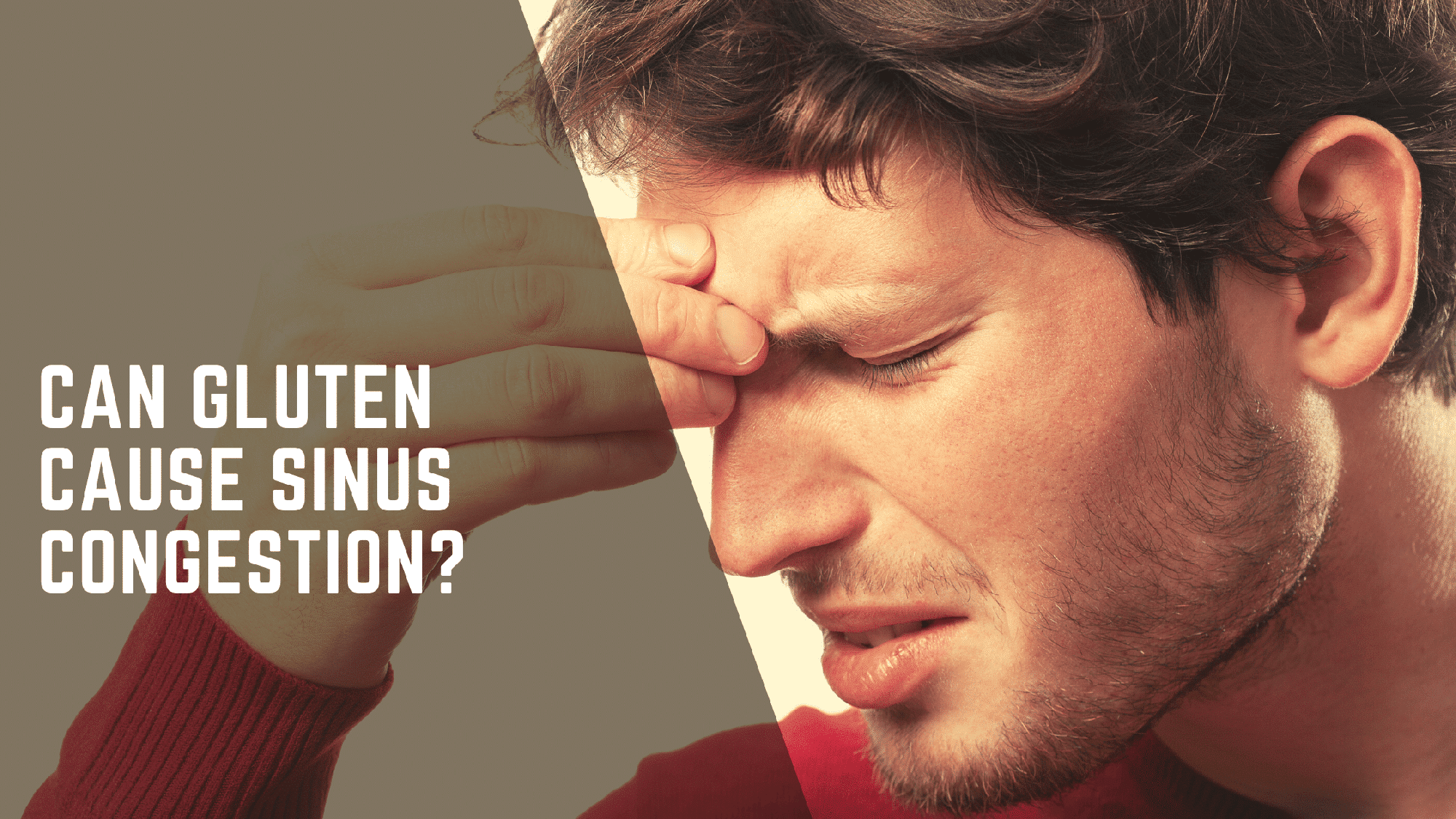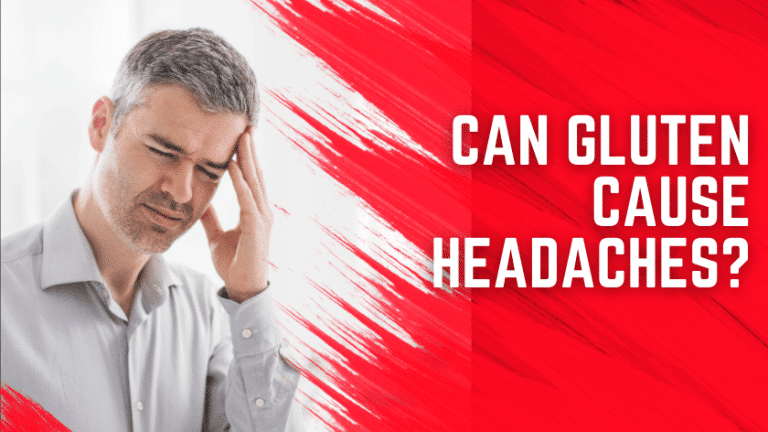Can Gluten Cause Sinus Congestion? – An Unlikely Culprit in the Spotlight

While most people associate digestive problems with celiac disease, it’s known to cause many other symptoms you wouldn’t have thought of.
So, imagine my surprise when I found out that there’s a potential link between gluten and sinus congestion. Yup, consuming gluten when I shouldn’t was potentially causing my celiac sinus problems!
In this article, we’ll take a closer look at the link between gluten and sinus congestion and what you can do to ease your symptoms and get back to breathing more clearly!
An Overview of Sinus Congestion
There’s nothing fun about sinus congestion. That feeling when you can’t breathe through your nose. The pressure in your forehead and around your eyes. The never-ending stream of snot. Yeah, pretty unpleasant stuff.
But unfortunately for many, sinus congestion is common, particularly during cold and flu season. But what exactly is sinus congestion? Let’s take a closer look.
Sinus congestion, also called sinusitis, is an inflammation of the mucous membranes that line the sinuses. It’s often caused by a cold or allergies and can be acute — lasting up to four weeks — or chronic — lasting 12 weeks or more. Common symptoms of sinus congestion include:
- Facial pain or tenderness
- Inflammation of the area around the eyes
- Greenish nasal drainage
- Bad breath
- Coughing
- Toothache
- Headaches
- Fatigue
- Runny nose
Exploring The Link Between Gluten And Sinuses
Unsurprisingly, those with celiac disease or gluten intolerance should not consume gluten if they want to feel comfortable and healthy.
But did you know that consuming gluten can also result in sinus congestion – an uncomfortable feeling that could leave you out of commission for days?
While it’s not a common symptom, it could be attributed to the inflammation within the body caused by food containing wheat, rye, barley, and other associated grain products.
So next time you find yourself congested and wondering why, a good place to start is assessing your daily diet – because, believe it or not, that muffin you ate this morning might have been the culprit!
The Role of Diet in Preventing Sinus Congestion
Sick of feeling like you’re breathing through a straw? It might be time to give your diet a makeover. Certain foods can help prevent sinus congestion, while others can worsen it.
Eating a well-balanced diet with plenty of fruits, veggies, lean proteins, and whole grains is crucial to keep your sinuses happy.
Load up on foods high in vitamin C, like citrus fruits and leafy greens, to boost your immune system and prevent inflammation in the sinuses. Spicy foods, such as chili peppers and ginger, can also help clear congestion and open up the airways.
It’s also worth cutting back on alcohol, as it can dehydrate the body and make sinus congestion worse. That’s why you’ll often feel stuffy after a heavy night on the booze!
What Other Symptoms Can Celiac Disease or Gluten Intolerance Cause?
Do you have a case of post-pizza bloat, along with a stuffy nose and some serious fatigue? It sounds like you might have celiac disease or gluten intolerance!
These conditions make it difficult for the body to digest gluten, a protein in wheat, barley, and rye. And let’s just say your body isn’t too happy about it.
For individuals with celiac disease, consuming gluten can damage the small intestine, leading to stomach pain, bloating, diarrhea, constipation, and weight loss.
Some people may also experience headaches, joint pain, and fatigue. In children, celiac disease can even cause delayed growth and development [1].
Individuals with gluten intolerance may also experience symptoms such as stomach pain, bloating, fatigue, headaches, and joint pain. They may also have other symptoms, such as skin rashes, eczema, and even anemia.
If you’re experiencing these symptoms, it’s time to chat with a healthcare provider. They can conduct testing to diagnose celiac disease or gluten intolerance and provide guidance on how to manage the condition.
3 Tips to Ease Sinus Congestion
Sick of feeling like you’re breathing through a straw? Sinus congestion can be a real pain, but don’t worry – we’ve got your back! Here are three tips to help ease that stuffy nose and open your airways.
Drink up! Staying hydrated is key when it comes to preventing sinus congestion. Water helps thin out mucus and keep it moving, so drink plenty of fluids throughout the day. Hot tea or soup can also help soothe a sore throat and open up the airways.
Spice it up! Spicy foods like chili peppers and ginger can help clear congestion. So, if you’re feeling stuffy, try adding spice to your meals or sipping spicy tea. Just be sure to keep a tissue handy in case you start sniffling!
Steam it out! Inhaling steam can help loosen up mucus and help you breathe more easily. Try sitting in a steamy bathroom with the shower running, or use a humidifier to add moisture to the air. You can also add a few drops of eucalyptus or peppermint oil to a bowl of hot water and breathe in the steam.
By following these tips, you can help ease sinus congestion and breathe easier. Give them a try today and see if they make a difference!
Can Gluten Cause Sinus Issues? – A Summary
Gluten and sinus congestion might seem like an unlikely pair.
Still, for those with celiac and sinus issues, consuming gluten can cause inflammation in the nasal passages and sinuses, leading to stuffy noses and painful sinus pressure.
If you’re a celiac or have a gluten intolerance, adhere to a strict gluten-free diet and be wary of potential cross-contamination.
If you don’t see any improvement, it’s well worth reaching out to your doctor or a registered dietician who can help you further explore the link between gluten and sinus issues.
Disclaimer: This content is based on my personal experience as an individual diagnosed with celiac disease and IBS (Irritable Bowel Syndrome) who follows a strict gluten-free diet. This does not constitute medical advice. Please consult a medical professional, nutritionist, or qualified dietitian for personalized, professional advice.




